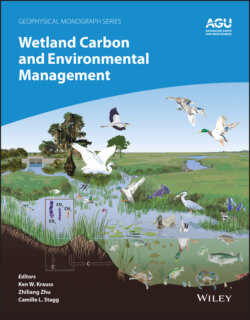Читать книгу Wetland Carbon and Environmental Management - Группа авторов - Страница 78
3.5.5. Managing Dissolved Organic Carbon Export
ОглавлениеWetland management can alter rates of wetland DOC export, with implications for both climate and water quality. Wetland‐derived DOC affects the color of aquatic systems, which can be seen by the casual observer as the tea‐colored water draining from swamps and organic‐rich soils. This colored DOC reduces the penetration of visible and ultraviolet light through the water column, can alter temperature gradients and vertical stratification, and affects primary production and food web structure (Schindler et al., 1996; Wetzel, 1992; Williamson et al., 1999, 2015). In aquatic systems, DOC also alters acid–base interactions, often by reducing the acid‐neutralizing capacity (Driscoll et al., 1994) and can alter the bioavailability of metals including aluminum, copper, and lead (Brooks et al., 2007; Landre et al., 2009; McAvoy, 1988).
Anthropogenic disturbances including drainage, deforestation, and fire can substantially change DOC dynamics and the chemical composition of the exported DOC (S. Moore et al., 2013; Rixen et al., 2016; Strack et al., 2008; Urbanová et al., 2011). The drainage of wetlands increases DOC export (Drösler et al., 2014; Kreutzweiser et al., 2008; S. Moore et al., 2013; Rixen et al., 2016). The rewetting of wetlands can return DOC export rates to pre‐drainage levels, although there may be a short‐term DOC pulse during the initial stages of rewetting (Blain et al., 2014). Further, disturbances such as drainage and deforestation cause an increasing fraction of the DOC to be derived from preserved soil carbon rather than recent plant production (Gandois et al., 2013; S. Moore et al., 2013). Over time, the depletion of soil carbon due to disturbance can reduce the export of DOC (Sippo et al., 2019). Fires in peatlands can cause a short‐term increase in DOC concentrations and export (Clay et al., 2009; Olivares et al., 2019; Zhao et al., 2012) but a decrease over the longer‐term (1–10 years post‐fire; Shibata et al., 2003; Worrall et al., 2007). The effects of fire on DOC export may be less important than the effects of climate change in northern peat‐dominated catchments (Burd et al., 2018). Lastly, wetlands export substantially more DOC per unit area to aquatic systems than do other land use types (Raymond & Hopkinson, 2003) so where wetlands have been lost, there likely has been a substantial reduction in the amount of DOC export (Kristensen et al., 2008; Raymond et al., 2004).
